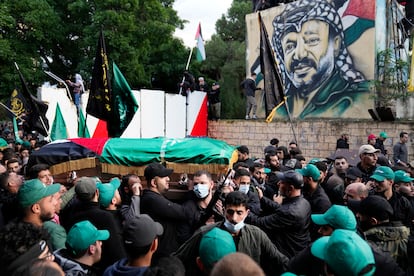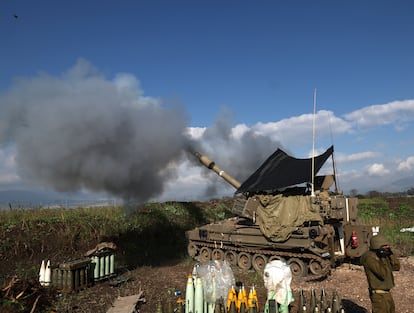Israel warns US time is running out to prevent war from spreading to Lebanon
Washington sends Secretary of State Antony Blinken back to the Middle East to try to prevent an escalation of tensions

The assassination of Hamas’s number two man, Saleh al-Arouri, in a Beirut suburb on Tuesday with a missile strike has exponentially ramped up tensions between Lebanon’s Hezbollah guerrilla and Israel. And this could pull Lebanon into the conflict. While waiting to see if the threats of revenge by the Shiite group’s leader, Hassan Nasrallah, come to fruition, the Israel Defense Forces have been placed on high alert in the north of the country. The United States, unwilling to see the Gaza war spread to the north, has embarked on a diplomatic drive to reach an agreement that would prevent the regionalization of the conflict. On Thursday, Israel warned its main strategic ally that the deadline to accomplish this is fast approaching.
U.S. President Joe Biden has sent one of his chief advisers, Amos Hochstein, to Tel Aviv to attempt to avert escalation through dialogue with both sides. The Washington emissary met Thursday with Israeli Defense Minister Yoav Gallant. The meeting was also attended by Israel’s chief of general staff of the Israel Defense Forces, Herzi Halevi, as well as other diplomats and military officials. Hochstein is an old acquaintance of both sides. In 2023, he mediated between Lebanon and Israel to settle disputes over the two countries’ territorial waters, and reached an agreement.
Gallant’s message is crystal clear — the Israeli government is not willing to wait indefinitely for such mediation to prove fruitful. Benjamin Netanyahu’s executive would prefer an agreement, but is running out of patience after three months of exchanging artillery and missile fire with Lebanese guerrillas in the border area. It is now threatening more decisive military action against the neighboring country. “We’re at a crossroads” Gallant warned Hochstein, according to a press release issued by his ministry, before adding, “we prefer a diplomatic agreement, but there is a tight timeline to achieve this.”
‘A new reality’
Since the Hamas attacks on October 7, which claimed 1,200 lives in Israel and sparked a military response in Gaza that has to date killed more than 22,000 people, most of whom are civilians, the Netanyahu government has evacuated nearly the entire population of the border area with the Strip. In addition, some 80,000 people have been displaced from villages on the border with Lebanon and which the government has been maintaining since then in different parts of the country. “There is only one possible solution,” Gallant stressed to Hochstein, “a new reality in the northern region that will enable the safe return of our citizens.”
Israel has deployed 200,000 troops near the Lebanese border. At least 177 people have been killed since fighting began in the area. Thirteen of these were Israelis, including four civilians, while in Lebanese territory 127 members of Hezbollah, 16 members of other pro-Palestinian militias, one Lebanese soldier and 20 civilians have lost their lives, according to Efe news agency. The hostilities have also resulted in the displacement of some 70,000 Lebanese residents in the south of the country.

Tension in the area has increased following the assassination of Hamas’ number two man, Saleh al-Arouri, on Tuesday in Beirut. Though Israel has not acknowledged responsibility for the attack — U.S. intelligence sources have attributed it to Israel — the government has assured that “whoever it was” intended to carry out an attack against Hamas and not against Lebanon. Days earlier, the defense minister had assured that Israel is currently fighting on seven fronts — Gaza, the West Bank, Lebanon, Syria, Yemen, Iraq and Iran — and has already delivered strikes on six of them.
On Wednesday, uncertainty was compounded by the bombings that killed more than 84 people in Kerman, Iran, which the Islamic State group claimed responsibility for on Thursday, and there was understandable tension. On four of the fronts discussed by Gallant, Israel is confronting Iranian-backed groups: Hezbollah in Lebanon, pro-Iranian guerrillas in Syria and Iraq — where they are in combat with the U.S. army — and the Houthi rebels in Yemen, who have not only carried out attacks against southern Israel, but have also targeted merchant ships sailing the Red Sea to and from the Suez Canal, disrupting international maritime traffic in the area.
As of Thursday, U.S. Secretary of State Antony Blinken, who has embarked on a new trip to several countries in the region where he will also visit Israel and the West Bank in a fresh attempt to obtain de-escalation, will help Washington in its efforts to prevent the expansion of the conflict. The head of U.S. diplomacy will visit Turkey and Qatar, where several Hamas leaders have taken refuge over the years. Qatar and Egypt (where he will also be traveling to) are acting as intermediaries for a new agreement to broker a new ceasefire and a renewed exchange of Israeli hostages for Palestinian prisoners. Blinken will also visit Greece, Jordan, Saudi Arabia and the United Arab Emirates.
Meanwhile, Beirut is also striving to de-escalate the tension. Immediately after Al-Arouri’s death, the Lebanese government confirmed that it was in talks with Hezbollah to prevent a revenge operation for the attack. This Thursday, its foreign minister, Abdallah Bou Habib, met in Washington with Brett McGurk, President Biden’s Middle East advisor. According to the Lebanese state news agency, the minister underlined “the importance of U.S. diplomatic efforts to ensure Lebanon’s neutrality in the Gaza war.”
Meanwhile, in the Gaza Strip, Israel intensified its shelling of the center and the south on Thursday. The Emergency Coordinator of Doctors Without Borders at the Al Aqsa hospital in Deir al-Balah, Carolina López, reported an intensification of aerial fire on the Al-Bureij and Al-Maghazi refugee camps, located a few kilometers from the medical center. A total of 106 people were killed at the latter on Christmas Eve, in one of the war’s bloodiest episodes. In the Nur Shams refugee camp near Tulkarem in the occupied West Bank, the Israeli army arrested 300 people and bombed various buildings.
On another front in this war, Yemen, the Houthi guerrillas have attacked the United States because of its formation of a naval coalition to fight them. “The formation of a U.S. alliance to protect Israeli ships represents a serious threat to the safety of shipping,” the guerrilla group said in a statement before threatening the countries that are part of it. “Those involved must endure the consequences of their dangerous and irresponsible escalation,” the rebel group added.
Sign up for our weekly newsletter to get more English-language news coverage from EL PAÍS USA Edition
Tu suscripción se está usando en otro dispositivo
¿Quieres añadir otro usuario a tu suscripción?
Si continúas leyendo en este dispositivo, no se podrá leer en el otro.
FlechaTu suscripción se está usando en otro dispositivo y solo puedes acceder a EL PAÍS desde un dispositivo a la vez.
Si quieres compartir tu cuenta, cambia tu suscripción a la modalidad Premium, así podrás añadir otro usuario. Cada uno accederá con su propia cuenta de email, lo que os permitirá personalizar vuestra experiencia en EL PAÍS.
¿Tienes una suscripción de empresa? Accede aquí para contratar más cuentas.
En el caso de no saber quién está usando tu cuenta, te recomendamos cambiar tu contraseña aquí.
Si decides continuar compartiendo tu cuenta, este mensaje se mostrará en tu dispositivo y en el de la otra persona que está usando tu cuenta de forma indefinida, afectando a tu experiencia de lectura. Puedes consultar aquí los términos y condiciones de la suscripción digital.








































